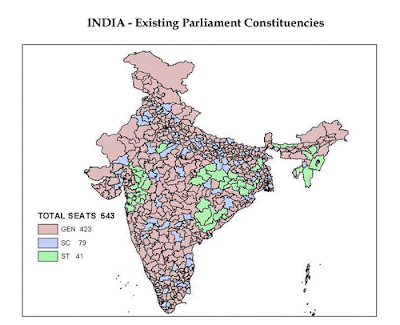[The number of persons
with a criminal background has shown an alarming increase in Parliament and
State Legislatures in recent years. In 2004, 23.2 per cent of Lok Sabha members
had criminal antecedents. During the
2009 election, the number rose to 30 per cent. The number of crorepatis in the
Lok Sabha, which was 156, or 29 per cent in 2004, rose to 304, or 58 per cent,
in the present Lok Sabha. This shows a close and growing link with the world of
crime, among other things.]
By Madhuri Shukla
A majority of those who
come to the Lok Sabha or to the State Assemblies are elected by a minority of
votes cast in their favour. There have been MPs and MLAs who secured even less
than 15 per cent and still won.
India is in urgent need
of electoral reforms. But what should it be: A US-style presidential election
or two-to-three national party system? This issue is the debate of the hour
among constitutional experts, political stalwarts and also the commoner. In the
past, BJP patriarch LK Advani had raised the issue of having a two-to-three
national party system for the Lok Sabha elections. Without the ventilator
support from many regional parties, no Government can survive, let alone
implement reforms. But no leader speaks in favour of electoral reforms.
Today, we have more
than 3.2 million elected representatives. The 15th General Election to Lok
Sabha was the largest and the most stupendous electoral exercise anywhere in
the world and was universally acclaimed as free and fair. It cannot, however, be denied that if we look
at the state of our democracy today, there is much to hang our heads in shame.
During the recent
years, the composition of our Legislatures and the conduct of our Legislators
and Ministers has been a matter of disgrace for democracy. Governments have
lost their credibility. People have
seen democratic Governments surviving
through the politics of brinkmanship and blackmail. There is disconnect between the people and
the politicians. There can be no greater
threat to democracy than a scenario in which the people lose faith in the
representatives they elect.
Elections are the
foundation of democracy. Unfortunately, our electoral system and processes are
afflicted by seven maladies : Money Power, Muscle Power, Mafia Power, Casteism,
Communalism, Criminalisation and Corruption.
To win an election, you
need votes and notes. To garner votes you need to mount massive election
campaigns which require truckloads of money.
Money is needed not only for campaigning, but for buying, bribing,
cajoling and black-mailing the voters and their leaders. According to a recent study of State Assembly
elections, 34 per cent of all the voters were believed to have been paid in
cash.
On an average, a Lok
Sabha seat election cost between Rs 5 crore to Rs15 crore. It is natural that
the winning candidate should try to recover the amount which he has spent, and
something more to take care of the next election — and for the rainy day. If that
is possible through corruption, so be it.
The question is: Where
does this money come from? Nobody pays
his hard-earned tax-deducted white money to politicians. But no one parts even with his black money
without expecting good returns on the investment. During the licence raj,
industrial houses financed political parties and election campaigns. Then, the
mining, land and the crime mafia joined in.
After that, the
criminals, smugglers, illicit drug and arms dealers and gangsters paid the
politicians what they called ‘protection money’. Soon, the criminals realised
that, since elections were being conducted with their money and muscle power,
they should themselves enter in politics. The result is before us all to see.
The number of persons
with a criminal background has shown an alarming increase in Parliament and
State Legislatures in recent years. In 2004, 23.2 per cent of Lok Sabha members
had criminal antecedents. During the
2009 election, the number rose to 30 per cent. The number of crorepatis in the
Lok Sabha, which was 156, or 29 per cent in 2004, rose to 304, or 58 per cent,
in the present Lok Sabha. This shows a close and growing link with the world of
crime, among other things.
Our founding fathers
wanted to build a united nation from a highly segmented feudal society. But
today, political leaders play divisive politics to build vote banks that
catapult them to power. Politicians in all parties have a vested interest in
keeping the people divided, backward, poor and illiterate. For example, as the
Sachar Committee showed, precious little has been done during the last 65 years
to ameliorate the condition of minorities. Similarly, no serious effort has
really been made for the upliftment of the Scheduled Castes and Scheduled
Tribes.
Today, the
representational legitimacy of our elected representatives stands seriously
eroded. Available statistics show that, if you have a secured vote-bank of 15
per cent, you can be 90 per cent sure of winning. How to build this 15 per cent vote-bank is
the concern of every candidate. Also, if
you can be sure of winning with the support of this 15 per cent vote- bank, why
should you bother about the other 85 per cent?
Thus, the majority of
those who are elected to the Lok Sabha or to State Assemblies are elected by a
minority of votes cast in their favour. There have been MPs and MLAs, who
secured even less than 15 per cent and yet became Ministers. Can they really be
called representatives of the people? Unfortunately, the number of those
elected by a minority of the votes cast is increasing. Those winning Lok Sabha
seats with a majority of votes was 218 in 1999, and in 2009, it came down to
just 120.


